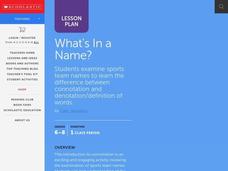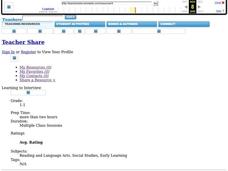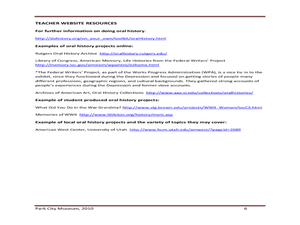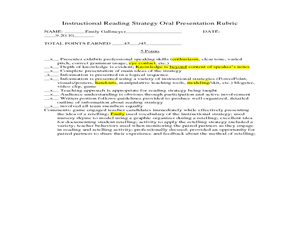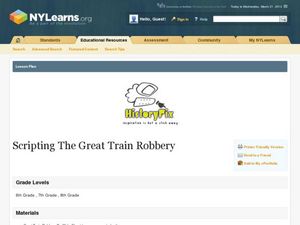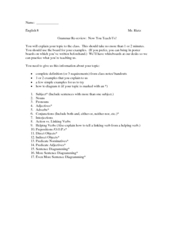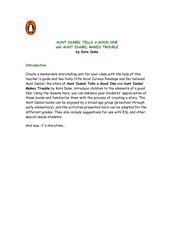Curated OER
What's In a Name?
Introduce your language arts class to connotation, denotation, and diction. Middle schoolers identify and differentiate between the connotative and denotative meanings of words by analyzing the fictitious sports team names. Learners...
Curated OER
Descriptive Writing: Color Description Worksheet
In this language arts worksheet, students generate words that describe each of the 5 colors listed. Students write adjectives to tell what the color looks, feels, tastes, smells and sounds like.
Curated OER
I Imagine
In this Language Arts worksheet, students choose an animal to draw and write a description about it. Students read their descriptions to their classmates who also draw an illustration.
Curated OER
Prepositions
Elementary schoolers view and study ten pictures of the location of a ball adjacent to a box. They decide where the ball is and match it to its appropriate preposition on the right. A good language arts lesson!
Curated OER
Regular or Irregular: Two Kinds of Verbs
The two kinds of verbs, regular and irregular, are the focus of this language arts worksheet. After a thorough, two-page description of both types, young grammarians fill in the present tense verb given the simple past and past...
Curated OER
A Now Thing: Present Tense Verbs
Present tense verbs are the focus of this language arts worksheet. Students review verb tenses, and identify present tense verbs in 22 sentences. Some good, solid practice can be found in this fine worksheet.
Curated OER
Paired Conjunctions
Learners identify parallel parts of sentences, meaning of sentences, and determine positive, negative, and choice conjunctions. Conjunction identification is the main focus of this language arts worksheet.
Curated OER
Learning to Interview
An authentic and engaging way to practice literacy skills, this lesson calls for young language arts pupils to conduct interviews with classmates and family members. First, pupils watch as the teacher models the interview process with a...
Curated OER
Oral History: Park City Museum
Bring U.S. history to your language arts class with this lesson. Middle schoolers complete an interview for an oral history project, and discuss the importance of oral histories - and how they embellish written accounts. They write...
Curated OER
Retelling
Explore language arts by completing a story worksheet in class. Readers will identify the importance of plot, setting, and character while they write their own short story. They also retell their story to a classmate and participate in a...
Curated OER
A Poem for Two Voices for Dr. Jekyll and Mr. Hyde
Poems For Two Voices are a great resource in any language arts classroom, whether you are studying poetry or not. Focusing on The Strange Case of Dr. Jekyll and Mr. Hyde, this lesson plan prompts young authors to write a Poem For Two...
Curated OER
Scripting The Great Train Robbery
Take writing prompts to another level in this activity, which allows pupils to create scenes of dialogue based on the 1903 silent film, The Great Train Robbery. Useful for a language arts/history cross-curricular activity, the lesson...
Curated OER
Test Review Sheet: Irony, Comma Rules, and Sentence Variety,
Covering vocabulary, literary analysis, and grammar, this instructional activity would be a great study guide or homework assignment for an eighth-grade Language Arts class. Though the five stories by Edgar Allan Poe, O. Henry, and Oscar...
Curated OER
Grammar Re-review: Now You Teach Us!
Turn the tables on your language arts pupils by letting them be the teachers! With a list of grammatical topics to choose from (subject, adverbs, direct objects, etc), eighth graders plan a presentation to "re-review" the concept with...
Curated OER
Aunt Isabel Tells a Good One...
Explore language arts by reading two similar stories in order to compare and contrast them in class. Young readers read two Aunt Isabel books, by Kate Duke, and discuss the main characters, plot, and setting. They complete a graphic...
Curated OER
What I Have Learned: Phonics Review
Providing an exploration of phonics rules, including the use of suffixes, this presentation would be a good tool to use as part of a language arts lesson. The easy-to-understand information on the slides could solidify these concepts in...
Curated OER
One-Word Modifiers: Adjectives and Adverbs
Introduce your students to adjectives, adverbs, and the differences between them with this helpful grammar presentation. Though it appears long at 79 slides, note that each slide is doubled, with the first slide asking a question and the...
Curated OER
Synonyms
Synonyms are very important words in the world of language arts. This PowerPoint serves as a review for those who have been exposed to synonyms. The interactive component of this presentation is quite good. Pupils must choose the correct...
Curated OER
Symbolism
Start your language arts lesson with this quick PowerPoint that defines symbolism. Following the definition is a sentence describing the American flag as a symbol to the United States. Tip: After reading these slides, have students write...
Curated OER
Poetry
Explore the semantics of poetry with this higher-level presentation. With examples from Dickinson, Frost, and Dr. Seuss, the slides clearly explain the details of poetic structure, license, and schemes. You could use this in a language...
Curated OER
CVC Puzzles
Words that use the consonant/vowel/consonant pattern are the focus of this language arts presentation. Students are shown a word that has the vowel missing and a picture representing the word. They have to choose one of the five vowels...
Curated OER
Capital Letters
When and how to use capital letters is the focus of this language arts presentation. The first slide gives the five most common rules for using capital letters. The rest of the slides give young readers lots of practice. Instant feedback...
Curated OER
Compound Words
This 14-slide language arts presentation does a credible job of introducing how compound words work. It gives learners many examples, along with pictures, to practice reading compound words. Nicely-done!
Curated OER
Reciprocal Reading
The strategies associated with Reciprocal Reading are outlined in this language arts presentation. Pupils discover what it means to be the questioner, the summarizer, the predictor, and the clarifier. All four strategies lead to...
Other popular searches
- 5th Grade Language Arts
- 3rd Grade Language Arts
- 4th Grade Language Arts
- Second Grade Language Arts
- English Language Arts
- 1st Grade Language Arts
- Kindergarten Language Arts
- Language Arts Jeopardy Game
- First Grade Language Arts
- Language Arts School Projects
- Language Arts Lesson Plans
- Language Arts Games


